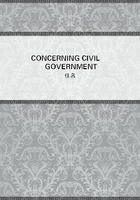
第43章
Of Paternal, Political and Despotical Power, Considered Together 169. THOUGH I have had occasion to speak of these separately before, yet the great mistakes of late about government having, as I suppose, arisen from confounding these distinct powers one with another, it may not perhaps be amiss to consider them here together.
170. First, then, paternal or parental power is nothing but that which parents have over their children to govern them, for the children's good, till they come to the use of reason, or a state of knowledge, wherein they may be supposed capable to understand that rule, whether it be the law of Nature or the municipal law of their country, they are to govern themselves by- capable, I say, to know it, as well as several others, who live as free men under that law. The affection and tenderness God hath planted in the breasts of parents towards their children makes it evident that this is not intended to be a severe arbitrary government, but only for the help, instruction, and preservation of their offspring. But happen as it will, there is, as I have proved, no reason why it should be thought to extend to life and death, at any time, over their children, more than over anybody else, or keep the child in subjection to the will of his parents when grown to a man and the perfect use of reason, any farther than as having received life and education from his parents obliges him to respect, honour, gratitude, assistance, and support, all his life, to both father and mother. And thus, it is true, the paternal is a natural government, but not at all extending itself to the ends and jurisdictions of that which is political. The power of the father doth not reach at all to the property of the child, which is only in his own disposing.